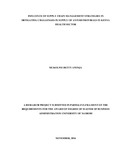| dc.description.abstract | Approximately 1.6 million Kenyans are HIV Positive which poses both social and economic challenges for the country. The HIV/AIDS target set by The Joint United Nations Program states that 90% of all HIV positive people should be diagnosed, and 90 percent of those on treatment virally suppressed. (Chemonics Final report, 2015). This implies availing antiretroviral (ARV) drugs to approximately 1.3 million people. Use of Anti-retroviral Therapy was found to be a more cost-effective intercession against HIV/AIDS. Despite increase in donor funding towards the health sector, there exists challenges in the supply-chain and also at the health institution which may be restricting access to ARVs. High cost of commodities, and product quality concerns are some of the challenges affecting reliable and effective delivery of ARVs. One patients‟ annual treatment costing an average of US$ 248.00. In 1999, the government stated that HIV and AIDs was a national tragedy. It set up the National Aids Control Council (NACC) to manage the multi-sectoral response to this public health threat. The study aimed to determine the effectiveness of supply chain management strategies in mitigating challenges in supply of ARVs in Kenya health. The study reviewed theoretical and empirical literature on supply chain on health service delivery institutions. Descriptive survey was used as the research design. Population of the study comprised of 345 health institutions. A sample of 34 respondents was selected using convenient random Sampling technique. A structured questionnaire was administered in the collection of Primary data. Data analysis was done using descriptive statistics. The data was presented in frequency tablets, analysed through frequency counts, percentages and cumulative percentages. The study findings concluded that ARV supply chain challenges have great negative impacts on the services of health sector in Kenya. The study concluded that supply chain strategies have been used to a large extent in mitigating challenges in supply of ARVs in the Kenyan health sector. Further, the study concluded that quality of service delivery processes have been enhanced in the health sector in Kenya. The study recommended that policy makers should obtain guidance from the study in designing appropriate policies that can ensure effective logistics management especially in the health and medical sector. The study recommends that the management of the Kenyan health sector should address shortcomings in its service delivery; challenges experienced in the supply of health care commodities, and provide guidance in the up scaling of its activities for enhanced service delivery. The study recommends that scholars and academicians should carry in-depth studies on ARV supply chain management and implementation both in the public and private health care institutions | en_US |

